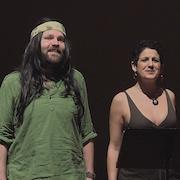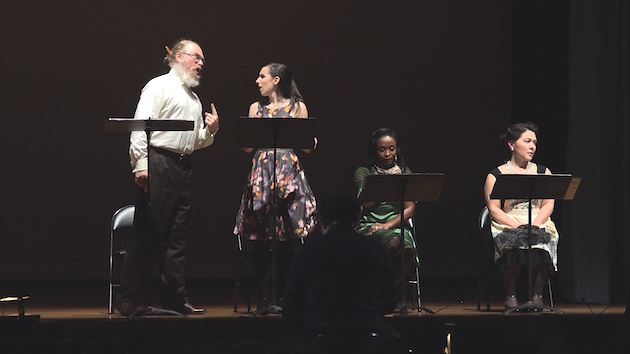
“We wanted to have something for everybody,” West Edge Opera’s General Director Mark Streshinsky said of the company’s Snapshot series, which presents excerpts from operas by local composers. Indeed, the four operas featured on Program One had such vastly different subjects — ranging from the biblical to the technological — it’s difficult to imagine anyone coming out of the January 22 performance without having enjoyed at least one of the works.
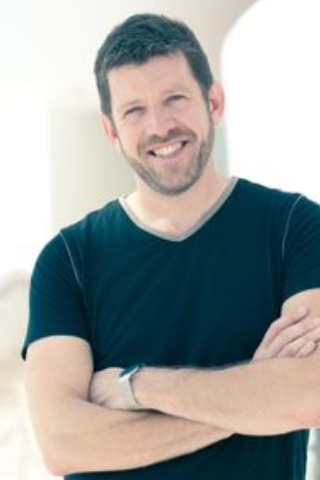
Concision and smooth pacing characterized Famous, by San Francisco Conservatory’s David Conte, the first excerpt on Sunday’s program at the Bayview Opera House. The narrator in this potent work is the artist and muse of Andy Warhol (bass-baritone Jason Sarten), Ultra Violet (soprano Ann Moss), whose memoir librettist John Stirling Walker skillfully adapts.
In the present day, Ultra muses about her relationship with Andy, as energetic unison lines — recalling, in the best of ways, Messiaen, and tightly delivered by Earplay musicians under conductor Mary Chun — usher in the dynamic Scene 1, set on July 20, 1969.
The simple exchange between Ultra and Andy that follows speaks volumes about their characters. On the historic day of the first manned moon landing, Ultra asks Andy, in soaring lines, what he thinks of it all. His reply (“It’s hard enough to be famous here”) sounds flat and uncomfortable. The scene’s climax, the viewing of the broadcast, is brief but powerful and, as imagined by Conte and Walker, Ultra’s story is an ideal show.
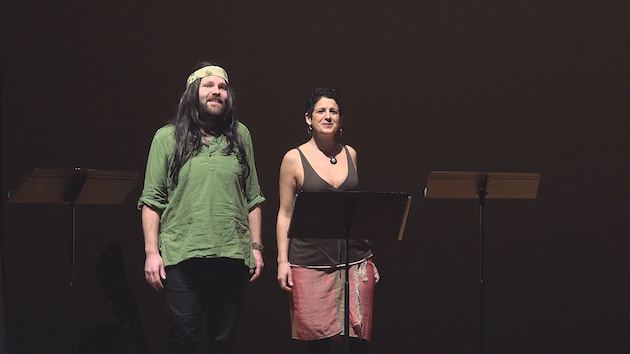
Born in 1986, William David Cooper is Program One’s youngest composer, and also its best orchestrator. The multitude of colors — shuddering trills and flutter-tonguing, unusual pairings — in Scene 3 of Hagar and Ishmael made the Earplay ensemble (conducted by Jonathan Khuner) sound twice its size. Mezzo-soprano Buffy Baggot was moving as Hagar, who, pregnant with Abraham’s child, has fled him and his jealous wife. An angel, imbued with refreshing corporeality by Sarten, convinces her to return home.
Strong motivic and harmonic schemes (tritones for the wilderness, major keys for the righteous) make Hagar an epic in the tradition of Wagner. Like its Wagnerian predecessors, however, this opera’s pacing needs work. Musically, a good deal of the recitative drags; in other places, the dialogue is the problem. After the Angel’s exit, Hagar dramatically resolves to return to Abraham (the powerful Baggott is perfect for this scene), but with any more lines, librettist Will Dunlap’s heavy-handed language would seriously wear on Cooper’s music. Nevertheless, this story was made for opera, and with some tweaking, Hagar and Ishmael could be a smash hit.
Sunday’s lowest moment was Alden Jenks’s Afterworld, a campy and implausible story that should have been either more fabulous or more serious. The plot upends Mary Shelley’s Frankenstein: After the human race has gone extinct, robots create The Woman (Moss), whom they keep in captivity as they prepare to salvage her reproductive organs, for reasons that never quite make sense.
In these scenes from Act 2, Jacob Thompson, as robot R-dot, did as well as he could, but the jerky monotone kills the scene: It’s odd that these robots are sophisticated enough to create a fully-functioning human, yet aren’t half as fluent as Siri. Perhaps R-dot can’t sing because he is, as the more advanced Scientist (Sarten) says with gentle humor, “a cheaper model.”
Jenks was the director of SFCM’s Electronic Music Studio, but he explained that, for ease of production, he decided against using digital technologies in Afterworld. It’s too bad: Electronic music could have helped this plot. As it was, the score had interesting moments, such as the interspersing of The Woman’s expressive melodies with resonant blips from the orchestra. But largely it wasn’t memorable, and because Moss’s acting carried this performance, the prospect for the first act — which takes place before she’s invented — is bleak.
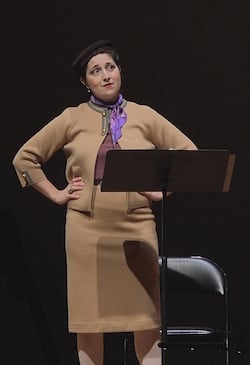
The home run was the finale: Why I Live at the P.O., by Stephen Eddins. Based on the Eudora Welty story, Sister (soprano Chelsea Hollow) narrates the events that led her to move out of her family home and into the post office, where she works.
It’s an ensemble piece, and in these scenes from Act 1, each singer shone: soprano Shawnette Sulker was charismatic as Stella-Rondo, the scheming sister; mezzo Kindra Scharich was a gentle but firm matron, and Sarten was comically stern as Papa-Daddy. Steering the performance was Hollow, whose indignation struck the perfect balance of martyrdom and pathos. Acting as her slightly younger self (ingeniously, Eddins splits the role of Sister into two parts, which allows the story to move even as Hollow narrates) was Kristen Princiotta, whose pure voice compensated for her exaggerated acting.
Eddins scored Sunday’s performance for jazz trio, and under his touch, the simple utterance “Papa-Daddy’d never cut off his beard” (adroitly adapted by librettist Michael O’Brien) becomes a hit the Andrews Sisters could have sung. After a 15-year composing hiatus, Eddins was inspired to write after seeing Menotti’s The Consul. With luck, he’ll write many operas to come.

